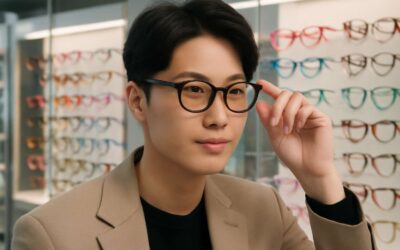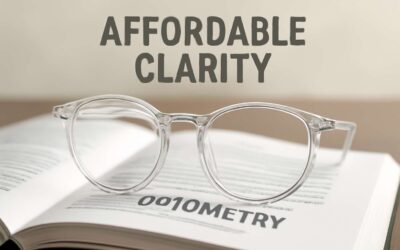Understanding Prescription Strength in Glasses
What Determines the Strength of Prescription Glasses – Explaining diopters and how lens power is measured
In the realm of vision correction, understanding the intricacies of prescription strength reveals a profound truth: not all glasses are created equally, and sometimes, they can be too strong. The fundamental measure of lens power is expressed in diopters, a unit that quantifies how much a lens bends light to focus images sharply on the retina. This measurement is crucial because it directly influences how clear or distorted your vision might be. When a prescription is too high, it can lead to discomfort, headaches, or even worsening eyesight over time.
What determines the strength of prescription glasses? Mainly, it hinges on an eye exam that assesses your refractive error—whether you’re nearsighted, farsighted, or have astigmatism. In some cases, a prescription can be overly high, prompting the question: can prescription glasses be too strong? The answer is yes, and recognizing the signs of overcorrection is essential for maintaining healthy vision. Overly strong glasses can cause eye strain and make it harder for your eyes to adapt naturally, leading to dependency on corrective lenses that might not be necessary.
Furthermore, the process of measuring lens power is precise, but it’s not infallible. Eye conditions can fluctuate, and what was once appropriate may no longer suit your evolving needs. For some, the temptation to opt for a stronger prescription may stem from a desire for sharper vision, but this can backfire, creating a cycle of overcorrection. Ultimately, understanding the delicate balance of prescription strength is key to safeguarding your eyesight and ensuring your glasses serve their true purpose—clarity without compromise.
Types of Vision Corrections and Their Prescription Ranges – Nearsightedness, farsightedness, astigmatism, presbyopia
Understanding prescription strength in various glasses types reveals the nuanced demands of vision correction. Each condition—whether nearsightedness, farsightedness, astigmatism, or presbyopia—requires a specific lens strength to optimize clarity. For example, nearsighted individuals often need negative diopter lenses to see distant objects clearly, while farsightedness calls for positive diopters to enhance close-up vision.
In cases of astigmatism, the prescription becomes more complex, involving cylindrical corrections that compensate for irregular corneal shapes. Presbyopia, an age-related decline in the eye’s focusing ability, typically demands reading glasses with distinct strength adjustments.
It’s essential to recognize that a prescription falls within a certain range tailored to each condition. However, can prescription glasses be too strong? Yes, they can. Overly high prescriptions might lead to eyestrain or headaches, especially if the correction surpasses the actual refractive error. In South Africa, where access to comprehensive eye care varies, understanding these ranges and recognizing signs of overcorrection can prevent unnecessary discomfort and long-term vision issues.
How Prescription Strength Is Prescribed by Optometrists – The role of eye exams and refraction tests
Every prescription begins with a comprehensive eye exam—a journey into the intricate machinery of the human eye. During refraction tests, optometrists measure how light bends when it enters your eye, determining the precise lens strength needed for clear vision. It’s a meticulous process, one that balances the delicate interplay between your eye’s natural focus and the corrective power of glasses.
Understanding how prescription strength is prescribed is vital—especially when considering if can prescription glasses be too strong. An overly high prescription can cause more harm than good, leading to eyestrain, headaches, and even worsening vision over time. That’s why, in South Africa where access to regular eye care can vary, trusting the expertise of your optometrist ensures your correction aligns perfectly with your actual needs.
Optometrists use sophisticated equipment and a nuanced understanding of visual physiology to determine the optimal lens power. This involves a combination of subjective testing—listening to your feedback—and objective measurements, which eliminate guesswork. When these two elements harmonize, a prescription is born, designed to sharpen your vision without tipping into overcorrection. Ultimately, it’s a careful act—one that safeguards your eye health and ensures your glasses serve you, not overpower you.
Signs Your Prescription Might Be Too Strong
Eye Strain and Discomfort – Headaches, tired eyes, and eye fatigue
Eye strain and discomfort are often silent signals that your vision correction might be off-kilter. When your prescription glasses are too strong, it can lead to persistent headaches, tired eyes, and an overwhelming sense of eye fatigue. These symptoms are your body’s way of telling you that your glasses are overcompensating, forcing your eyes to work harder than necessary.
Many individuals don’t realize that can prescription glasses be too strong, especially if the discomfort develops gradually. Overly powerful lenses can cause your eyes to strain as they attempt to adjust constantly. If you find yourself frequently blinking or rubbing your eyes after a few hours of wearing your glasses, it’s a clear sign your prescription might need revisiting.
In some cases, the discomfort may also manifest as blurry vision or a feeling of dizziness, further hinting at an overly strong prescription. Recognizing these signs early can prevent long-term eye strain and ensure your visual clarity remains sharp and comfortable.
Visual Distortions and Double Vision – Blurred vision, image distortion, and ghosting effects
For many, the sensation of seeing the world through a warped or ghostly veil can be startling. When your glasses are too powerful, visual distortions become an unwelcome guest in your daily life. Blurred edges, double images, or ghosting effects may creep into your vision, making even familiar surroundings appear strange and unsettling. These symptoms are often subtle at first, gradually eroding clarity and comfort.
Imagine looking at a friend’s face, only to see a faint double image lurking beside them—an eerie echo of their true form. This phenomenon is a common sign that your prescription might be too strong, causing your eyes to struggle with adjusting to the excess lens power. If you experience persistent visual distortions, it’s a clear signal that your glasses could be overcorrecting your vision.
In some cases, this overcorrection manifests as dizziness or a sense of imbalance—your eyes working overtime to reconcile conflicting signals. Recognizing these symptoms early ensures that you don’t unknowingly suffer the consequences of can prescription glasses be too strong, which can lead to further eye strain and discomfort. The key lies in paying close attention to how your vision feels after extended wear and seeking professional advice when needed.
Difficulty Focusing or Adjusting – Trouble switching focus between objects
Amid the delicate dance of vision, a subtle yet persistent challenge lurks—trouble focusing or adjusting between nearby and distant objects. When your prescription glasses are too strong, this struggle becomes more than mere inconvenience; it morphs into a daily ordeal. Your eyes, overwhelmed by the excess lens power, battle to find harmony, often leaving you feeling disoriented or fatigued.
Imagine trying to read a book, then suddenly glancing up to view a distant horizon—only to find your focus slipping, as if the world itself resists your gaze. This difficulty isn’t just a fleeting annoyance; it’s a sign that your prescription might be too strong. Some individuals report the sensation of double vision or ghostly halos when attempting to switch focus, further confirming that the lens strength may be overcorrected.
Persistent trouble shifting focus can lead to eye strain, headaches, and an unsettling sense of imbalance. If these symptoms persist, it raises a crucial question—can prescription glasses be too strong? The answer, often overlooked, underscores the importance of precise fitting and regular eye examinations. When the lens power exceeds what your eyes can comfortably handle, clarity becomes a distant dream, and your visual experience turns into a delicate, often tense, balancing act.
Risks and Consequences of Overly Strong Prescription Glasses
Eye Strain and Headaches – Long-term discomfort caused by incorrect prescription
Even a slight misjudgment in prescription strength can lead to significant discomfort, making one wonder—can prescription glasses be too strong? The answer is yes, and the consequences can extend beyond mere inconvenience. When glasses are overly potent, they often cause persistent eye strain, as the eyes work harder to focus through lenses that don’t match their needs. This relentless effort can lead to headaches that linger long after removing the glasses, dulling the clarity of daily life.
In rural communities where access to regular eye care may be limited, the risk of wearing overly strong glasses increases. Over time, this can result in a cycle of fatigue and visual disturbance that hampers productivity and well-being. It’s crucial to recognize that eye strain and headaches are often a sign that the prescription needs reassessment.
Understanding the impact of overly strong prescription glasses underscores the importance of precise optometry. When the strength isn’t just right, the discomfort can be long-lasting, affecting everything from reading a book under a thatched roof to driving along dusty country roads.
Altered Visual Perception – Impact on depth perception and spatial awareness
Overly strong prescription glasses don’t just cause eye discomfort—they can fundamentally alter how we perceive our surroundings. When lenses are too potent, they can distort depth perception and spatial awareness, making it challenging to judge distances accurately. For those living in rural areas, this misjudgment can be especially dangerous—impaired depth perception may turn a simple walk across uneven terrain into a risky venture. It’s a silent obstacle that hampers daily activities and increases the risk of accidents.
This altered visual perception often manifests as a disorienting experience, where objects seem closer or farther than they truly are. In some cases, it can cause a sense of imbalance or vertigo, making even familiar environments feel unfamiliar. The impact becomes more pronounced during tasks that require precise spatial judgment, like navigating dusty country roads or reaching for items on a crowded shelf. So, yes—can prescription glasses be too strong? The answer is a resounding yes, and the consequences can reach beyond mere inconvenience, affecting safety and overall quality of life.
Potential for Worsening Vision – Myths and facts about overcorrection effects
Many individuals assume that stronger prescription glasses automatically mean better vision correction. However, evidence suggests otherwise—overly strong glasses can do more harm than good. The myth that “more power equals clearer sight” often leads to overcorrection, a silent culprit behind worsening vision over time. When glasses are too strong, they can cause visual distortions that strain the eyes and distort the delicate balance of visual perception.
Persistent overcorrection may accelerate the decline of your natural eyesight, creating a vicious cycle where your eyes become increasingly dependent on stronger lenses. This phenomenon underscores the importance of precise prescription tuning—an area where optometrists play a crucial role. If you’ve ever wondered, “can prescription glasses be too strong?” the answer is a cautious yes—overcorrecting your vision can lead to discomfort, headaches, and a deterioration of your visual health.
In South Africa, where outdoor activities and rural navigation demand sharp spatial awareness, the risks become even more pronounced. Overly strong glasses can impair depth perception, making everyday tasks hazardous. It’s essential to recognize that more power isn’t always better—your vision deserves a carefully calibrated prescription that respects the natural limits of your eye health.
How to Determine if Your Prescription Is Too Strong
Consulting Your Eye Care Professional – Regular eye exams and prescription updates
Believe it or not, some folks walk around with prescription glasses so potent they could double as binoculars—or worse, a magnifying glass for tiny print! The question lingers: can prescription glasses be too strong? The answer is a resounding yes, especially if your eye care professional didn’t quite get the memo on your actual needs. Overcorrected glasses can turn clear vision into a blurry nightmare, causing unnecessary eye strain and headaches.
To determine if your prescription is too strong, regular eye exams are your best bet. Your optometrist, armed with the latest refraction tests, can accurately assess whether your glasses’ strength matches your current vision requirements. If you notice persistent discomfort, blurred vision, or an inability to focus properly, it might be time to revisit your eye care professional. Remember, an overly strong prescription can distort your visual perception, making simple tasks feel like a Herculean effort.
Self-Assessment Tips – Noticing changes in vision or comfort levels
Sometimes, your eyes whisper secrets you might not even realize. Have you ever felt that your glasses seem more like a magnifying glass than a tool for clarity? It’s a common concern: can prescription glasses be too strong? The unsettling truth is—absolutely. Overly potent lenses can turn routine tasks into frustrating puzzles, blurring your vision and causing relentless eye strain. Many people dismiss subtle discomforts or blurred images, unaware that their prescription might be the culprit. Recognizing the signs early can save your eyes from unnecessary fatigue and long-term damage.
Self-assessment can be surprisingly revealing. Notice if you experience persistent headaches after reading or if focusing on distant objects feels more difficult than before. If your vision feels distorted—images ghosting or double—it could be a sign that your glasses are too strong. Pay close attention to how your eyes respond during everyday activities. Sometimes, a simple test—like reading a sign from a distance or adjusting to different lighting—can expose whether your prescription is mismatched. When in doubt, consult your eye care professional for a comprehensive assessment, because can prescription glasses be too strong? The answer might surprise you. The key lies in listening to your eyes—they’re more perceptive than you think.
The Role of Eye Tests and Visual Acuity Measurements – Importance of accurate refraction testing
When it comes to eye health, precision is everything. A misstep in prescribing glasses can turn a simple task into a visual labyrinth, leaving you to wonder, can prescription glasses be too strong? The answer hinges on the accuracy of your eye tests and visual acuity measurements. A thorough refraction test isn’t just a formality; it’s the cornerstone of an accurate prescription. Without it, your lenses might be overcorrected or undercorrected, leading to discomfort and blurred vision.
Eye care professionals rely on sophisticated equipment to determine the exact strength of your lenses. This process involves assessing how your eyes focus light and how well they work together. If this measurement is off, it can result in glasses that are too strong, which might seem harmless initially but can cause persistent eye strain or headaches over time.
To truly understand whether your prescription is appropriate, consider the role of visual acuity measurements. These tests reveal how clearly you see at various distances and whether your current lenses meet those needs. An imprecise measurement can lead to a prescription that is too strong, making you question—can prescription glasses be too strong? The truth is, when eye tests lack accuracy, the answer is often yes! Regular, comprehensive eye exams are essential—they ensure your vision correction aligns perfectly with your unique visual demands, preventing unnecessary strain and preserving your eyesight’s longevity.
Adjusting or Correcting Overly Strong Prescriptions
Revisiting Your Eye Care Provider – Getting a new eye exam and updated prescription
In a world where our eyes are constantly at the mercy of screens, sunlight, and the relentless march of age, it’s no wonder that many wonder: can prescription glasses be too strong? The answer often hinges on the accuracy of your eye exam and the precision of your optometrist’s refraction test. When prescriptions are overestimated, the resulting glasses might seem like a good idea at first, but soon lead to discomfort and visual distortions that make everyday tasks seem more like a challenge than a breeze.
Revisiting your eye care provider for a thorough re-evaluation can be a game-changer. Sometimes, what was once deemed necessary might no longer align with your current needs. An updated prescription ensures that your glasses aren’t just a fashion statement but a functional tool. If you’re questioning whether your glasses are too strong, it’s worth scheduling a comprehensive eye exam — because, after all, can prescription glasses be too strong? The answer is yes, and only a professional can set the record straight, restoring clarity and comfort to your vision.
Proper Lens Selection – Choosing the right lens powers for your needs
When a prescription is too strong, it can cause more harm than good. Adjusting or correcting an overly strong prescription involves selecting the proper lens powers tailored to your specific needs. A professional optometrist can fine-tune your glasses, ensuring they match your current vision requirements perfectly. It’s essential to remember that wearing glasses with too high a diopter can lead to eye strain and headaches, making daily activities uncomfortable.
Choosing the right lens is crucial. For example, high-powered prescriptions require specialized lenses that minimize distortions and optimize clarity. Here’s a quick look at the process:
- Evaluate your current vision needs through precise refraction testing.
- Select lenses that balance correction with comfort, avoiding unnecessary overcorrection.
- Ensure the lens material and coating support your lifestyle, whether for work or leisure.
If your glasses are too strong, your vision can feel distorted or blurry, and you may experience double vision or difficulty focusing. Proper lens selection not only enhances visual clarity but also prevents long-term discomfort. So, can prescription glasses be too strong? Absolutely — only a professional can determine the ideal prescription for your eyes’ health and comfort.
Advantages of Glasses with Correct Prescription – Enhanced comfort and visual clarity
When prescription glasses are too strong, the consequences extend beyond mere inconvenience—eyes strain, headaches, and disorientation become unwelcome companions. Correcting an overly strong prescription offers a sanctuary of clarity, transforming a foggy world into a sharp, vivid landscape. The advantage of glasses with the proper prescription lies in the harmonious balance between correction and comfort, allowing the eyes to function naturally without undue effort.
Choosing the right lens involves meticulous fine-tuning by a professional optometrist, who considers your unique vision needs. Proper lens selection can prevent long-term discomfort and visual distortions. If your current glasses are too strong, they can cause double vision, blurred images, or difficulty focusing, making everyday tasks an ordeal. Only a skilled eye care professional can determine if can prescription glasses be too strong, ensuring your lenses are tailored perfectly to your eyes’ demands.
Preventing Prescription Errors and Ensuring Proper Fit
Importance of Regular Eye Exams – Monitoring changes in vision over time
Ever wondered if your prescription glasses might be too powerful? Turns out, it’s more common than you’d think. In fact, many people leave their eye exams thinking their glasses are spot-on, only to realize later that they’re experiencing discomfort or distortion. This raises an important question: can prescription glasses be too strong? The answer is a resounding yes, especially if regular eye exams aren’t part of your routine. Overly strong lenses can cause headaches, eye strain, and even worsen your vision over time. That’s why preventing prescription errors is crucial—an accurate refraction test is the backbone of proper lens strength.
Another cornerstone is ensuring the proper fit of your glasses. Ill-fitting frames or poorly aligned lenses can magnify the issue, making the glasses feel too strong or too weak. Regular eye exams help monitor changes in vision, ensuring your prescription remains in sync with your actual needs. Remember, your eyes are as unique as your fingerprint; what worked last year might not be right now. So, staying vigilant with scheduled check-ups not only prevents the risk of can prescription glasses be too strong but also safeguards your visual comfort and clarity.
Proper Fitting of Glasses – Ensuring frame alignment and lens placement
Many people assume that once their glasses are prescribed, they’re set for years. But the truth is, your vision can change rapidly — and if your prescription isn’t updated regularly, you might be left wondering, can prescription glasses be too strong? The answer is yes. Overly strong glasses can lead to unnecessary eye strain, headaches, and even distort your perception of depth and distance. This is why ensuring the proper fit and prescription accuracy is vital to maintaining visual comfort and clarity.
Proper fitting of glasses isn’t just about style; it’s essential for optimal vision. Frames should align perfectly with your eyes, and lenses need to be correctly positioned to avoid magnification issues or distortions. Ill-fitting glasses can exaggerate the problem, making your prescription seem too strong or too weak, which can contribute to discomfort and long-term eye fatigue. Regular eye exams help monitor these adjustments, ensuring your glasses are neither overcorrected nor undercorrected. When your lenses are properly aligned and your prescription is current, you significantly reduce the risk of can prescription glasses be too strong impacting your daily life.
Tips for Maintaining Correct Prescription Accuracy – Avoiding DIY adjustments and trusting professionals
When it comes to the delicate art of vision correction, precision is paramount. Many individuals overlook the importance of trusting qualified professionals, assuming that minor DIY adjustments won’t cause harm. However, attempting to alter your prescription glasses at home can lead to unintended consequences. Tweaking the frames or lenses without expert guidance might seem harmless, but it can distort your prescription, making your glasses too strong or too weak. This can result in increased eye strain, headaches, and even a worsening of your vision over time.
For those wondering can prescription glasses be too strong, the answer is often yes—if the fit isn’t properly maintained or if adjustments are made without proper tools and knowledge. To safeguard your eyesight, always rely on trained optometrists or optical professionals for any prescription updates or repairs. They use precise measurement techniques to ensure your glasses provide the perfect balance of correction and comfort.
Maintaining the correct prescription accuracy involves more than just regular eye exams; it’s also about ensuring your glasses are correctly fitted. Remember, proper lens positioning and frame alignment are essential. When in doubt, consult your eye care provider rather than attempting DIY fixes. By doing so, you protect your vision from the pitfalls of overly strong glasses, which can cause unnecessary discomfort and long-term issues. Your eyes deserve expert care—so trust the professionals to keep your vision crystal clear and comfortably corrected.




0 Comments